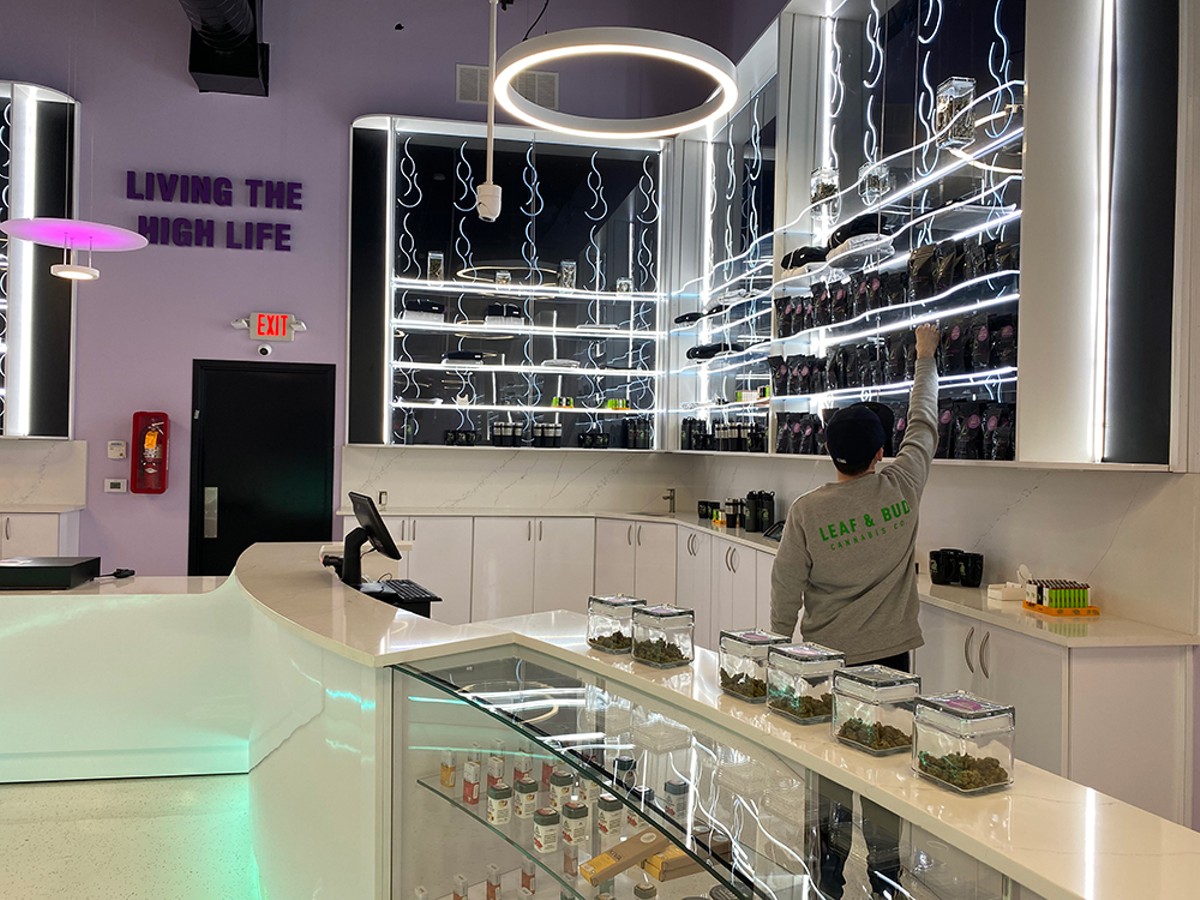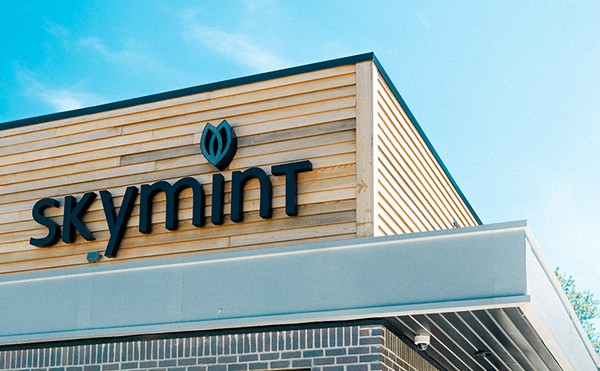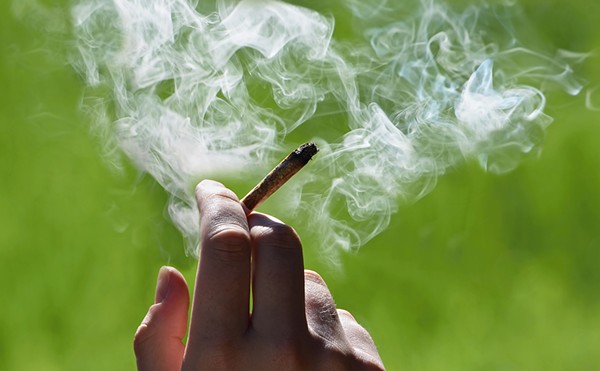Bully Kush, resin-coated moon rocks, lemon ginger gummies, cannabis-infused peanut butter, and wedding cake distillate. This ain't your grandpa's weed.
As Michigan's legal marijuana industry continues to blossom, dispensaries are offering an eclectic array of products, from meticulously grown flowers to delicious edibles and potent tinctures.
Recreational and medical marijuana sales in the state hit a record $115.4 million in March, a more than two-fold increase over March 2020, according to Headset, a company that analyzes cannabis consumer trends. There were 1.4 million transactions in March.
In 2020, the first full year of legal recreational sales, dispensaries rang up more than $500 million in purchases.
"Michigan's cannabis market is still growing," Cooper Ashley, a data analyst at Headset, tells Metro Times. "It flattened out a bit in late 2020 but appears to be trending up again."
Although the state allowed dispensaries to stay open during the COVID-19 pandemic, legal cannabis consumption declined late last year. But in early 2021, sales not only rebounded, they began to soar to record levels.
That growth is expected to continue in April as people celebrate 4/20, the national holiday for cannabis culture. During the week of April 20 last year, medicinal and recreational sales grew 48% over the previous four weeks in Michigan, despite the pandemic, according to Headset.
"I'd say that we should expect at least as big of a response this year, but I know the weather in Michigan can be pretty variable this time of year, so that will probably be a fairly influential factor on 4/20 celebrations and shopping," Ashley says.
As the legal industry grows, Michigan-based companies are churning out new products that are changing how cannabis is consumed.
Michigan leads the nation with the highest market share of edibles. In March, 14.4% of total recreational and medical cannabis sales were for edibles.
One of the leaders is UBaked, a Burton-based company that grows high-quality flower and makes concentrates, sublingual sprays, and delicious edibles. Its cannabis-infused candy-bar line includes peanut butter, chocolate mint, cookies 'n' cream, strawberry crunch, orange creamsicle, root beer float, dark chocolate cherry (with Michigan cherries!), and a Suberbaked bar that tastes like Michigan's famous Superman Ice Cream.
Their new gummy line, which premieres this week, includes pink lemonade, blue raspberry, cherry lime, tropical fruit, orange, cherry lime, and lemon ginger.
"We like the variety to keep it interesting," Amy Beauchamp, co-owner of UBaked, tells Metro Times.
UBaked's resource and development team includes a food scientist and a technician who are working on hard candies, gum, suppositories, beverages, and skin care products. They're also working on micro-emulsion to make their products faster-acting.
UBaked's flower products are also popular, with crystal-coated strains like Sluricane, cherry goji, apple fritter, skunk piss, ice cream cake, gelato 33, Oreoz, and apple tart. Another top-selling product is live resin, a concentrate for dabbers and vapers.
"Our flower and concentrates always do well," Beauchamp says.
Michigan is expected to enter the beverage market soon. In January, the Michigan Marijuana Regulatory Agency announced a new process that will allow companies to manufacture and sell THC-infused beverages.
Michigan now has 410 medical cannabis dispensaries and 260 recreational marijuana shops. The growth continued in 2021, with Michigan issuing licenses for 46 new medical cannabis dispensaries and 45 new recreational marijuana shops.
While the growth of the cannabis industry has been strong, its full potential has been stymied by communities prohibiting the sale of recreational marijuana. Fewer than 100 of the state's 1,764 communities permit recreational marijuana sales.
In Detroit, the state's largest city, recreational dispensaries and cannabis consumption lounges are expected to open in a few months. The city barred new recreational marijuana businesses until it could develop an ordinance to ensure that longtime residents weren't squeezed out by outside profiteers. A federal judge, however, ordered the city last week to temporarily halt processing licenses for recreational marijuana businesses while he considers a lawsuit challenging the city's "legacy" ordinance that gives priority to longtime residents.
For communities that embraced recreational marijuana dispensaries, the rising sales are welcome news. In March, the state doled out nearly $10 million to municipalities and counties from excise taxes generated from recreational sales in the 2020 fiscal year. Communities receive about $28,000 for each dispensary.
"Infusing over $28,000 per retailer and micro business into local government budgets across the state is very impactful and shows how strong and successful the industry is becoming," Andrew Brisbo, executive director of the state's Marijuana Regulatory Agency, said in a statement.
The excise tax also generated about $11.6 million for schools and $11.6 million for roads.
In March, Michigan doled out nearly $10 million to municipalities and counties from excise taxes generated from recreational sales of cannabis in the 2020 fiscal year.
tweet this
Oz Cannabis is one of the faster-growing dispensaries, which has cannabis shops in Detroit, Ypsilanti, Bay City, and Traverse City. In the next several months, it plans to open new dispensaries in Owosso, Pontiac, and Meridian Township.
Jamie Garmo, a member of Oz Cannabis' executive team, said product diversity is a key part of the business. Its dispensaries sell flowers, edibles, topicals, tinctures, concentrates, and vapes.
"There is a lot of sophistication in these products now," Garmo tells Metro Times. "People don't want to get high just go get high. They want to enjoy what they are doing. It's part of the experience."
It's not just products that have become more sophisticated, but the processes that go into making them, as well. A new cannabis dispensary and grow operation that claims to be Detroit's largest is set for a grand opening on April 20.
Leaf and Bud is located on Livernois Avenue, tucked around the corner behind the Value Save grocery store not far from the Avenue of Fashion and the University of Detroit Mercy. Despite its unassuming location, inside is a dispensary with a sleek, modern feel. The long showroom is flanked by two curvy, neon-accented countertops, and on a recent visit, workers were in the process of stocking the counters with a variety of products, including those from Future Grow Solutions, which shares a space in the 140,000-square-foot building.
Leaf and Bud and Future Grow Solutions are separated by a security gate. But over at the grow operation, there's a similar futuristic feel.
The space houses rows of Future Grow Solutions' "CropTowers," 11-foot-tall towers that the company's master cultivator, Billy Zangoulos, says uses a "hyperponic" system to grow cannabis plants that shortens the vegetation cycle by weeks. Each tower holds 102 plants, which are suspended in the air and surrounded by lights.
"We can take a clone from a mother, we can develop roots on that plant, and then we can put that plant directly into flower at a smaller size," Zangoulos says. "We're surrounding that whole tower with LED light. So we've sort of saved money on the power consumption with the modern lighting, and we've skipped like a two- to three-month life cycle that would be required in a traditional grow."
Zangoulos says it's the largest vertical 360 grow operation in the state.
"It's all computer-controlled," he says. "It's all water-fed, no dirt, no mess. It's a very clean approach to it."
Zangoulos says he started growing cannabis in 2008, when Michigan voters approved medical marijuana.
"I got into it because I had medical issues," he says. "I have Crohn's disease. So I was one of the first thousand patients in the state of Michigan to get a card. And from that day, my life changed."
Zangoulos says he's amazed at how far the industry has come since then. When he saw the sophisticated grow operation at Future Grow Solutions, "I couldn't not say yes," he says.
"It's awesome," he says. "Every day you go in and you smile and you sing to your girls, and I say hi and make sure they're fed."
Lee DeVito contributed to this report.
It's a new era for marijuana in Michigan. Sign up for our weekly weed newsletter, delivered every Tuesday at 4:20 p.m.








